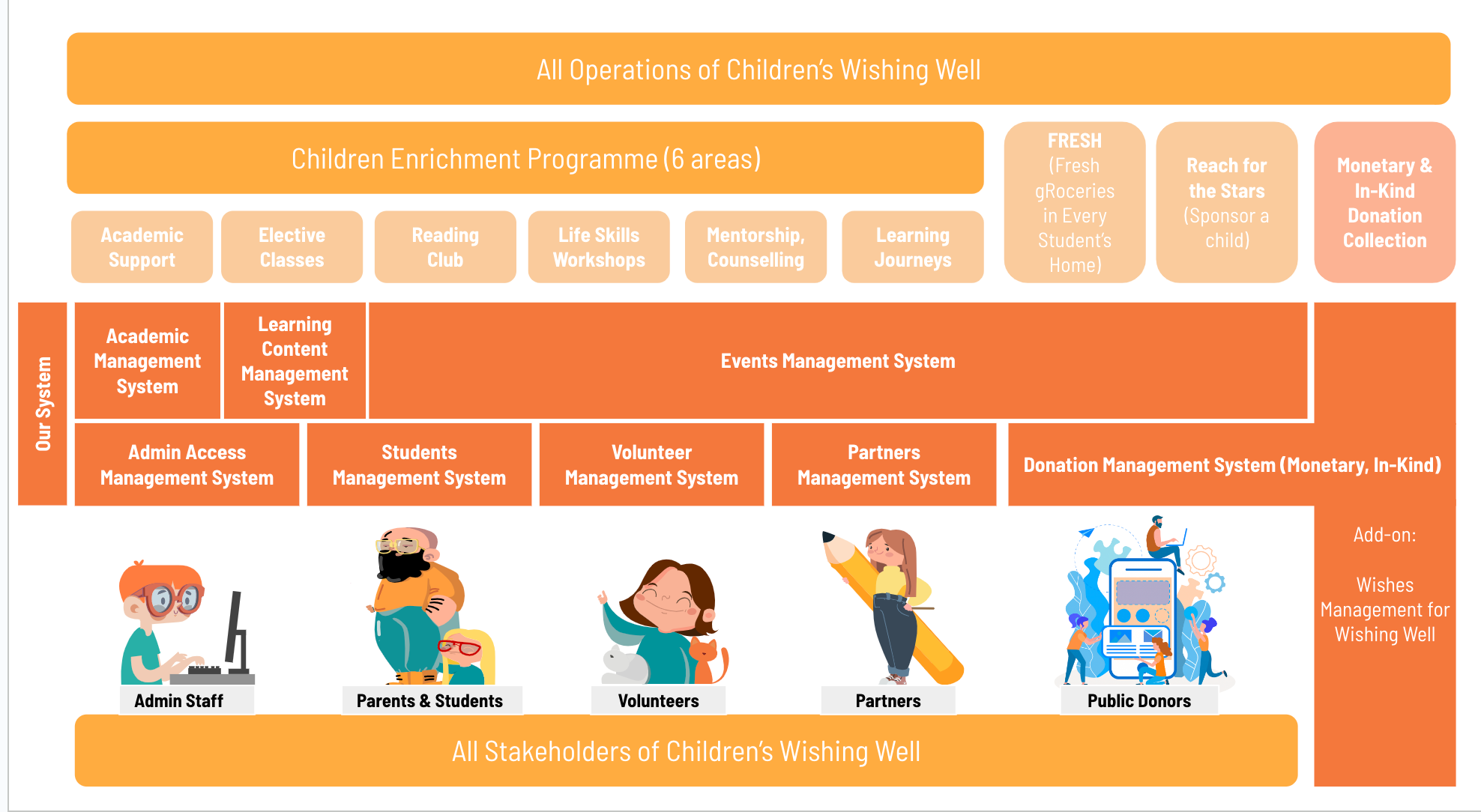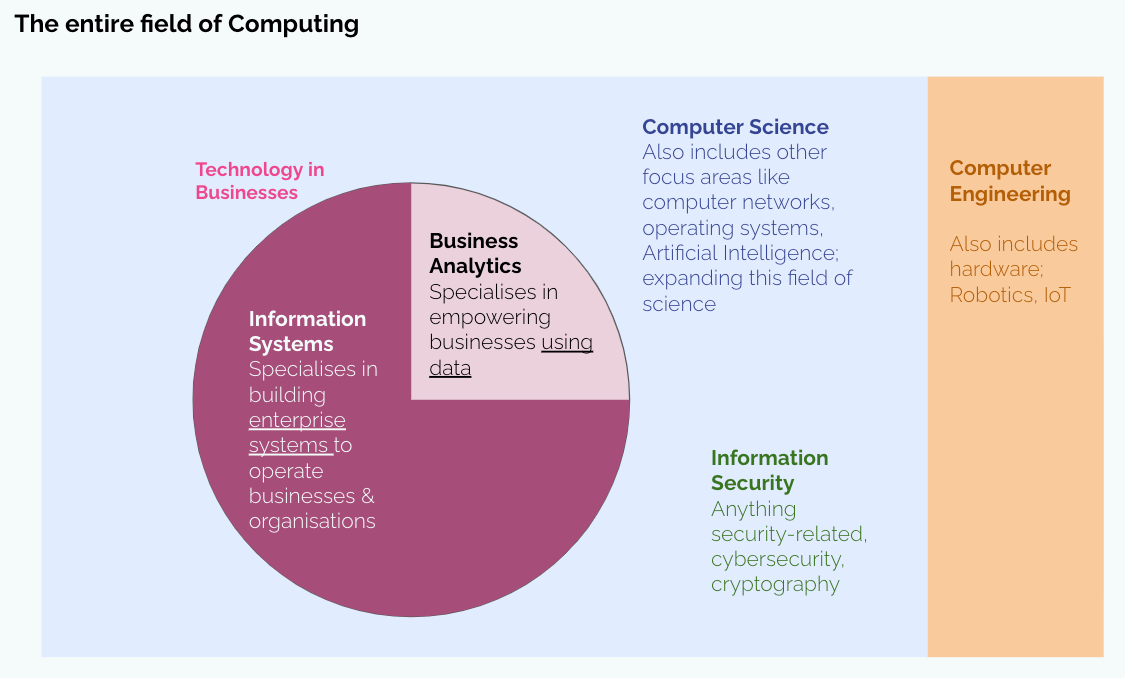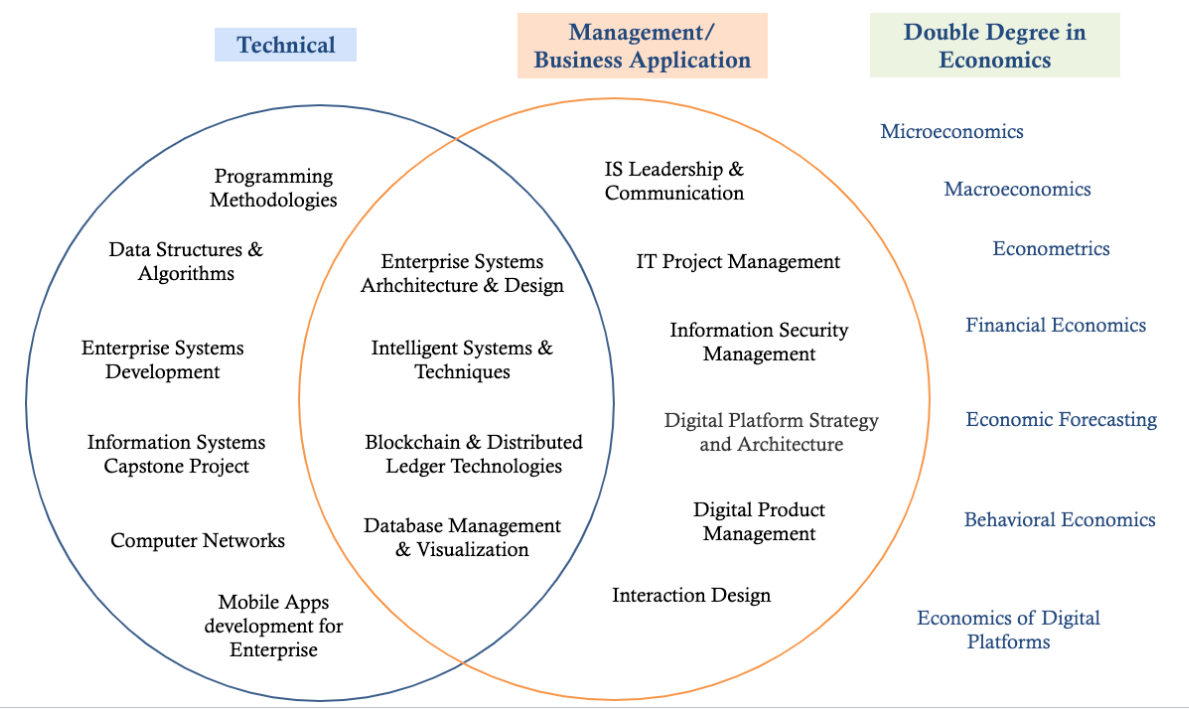Prospective students' guide to studying Information Systems at NUS
I am an Information Systems and Economics double degree student at NUS, matriculated in 2019. I am also part of NUS College, an honours interdisciplinary college. I have shared my experiences as an IS student at the NUS Open House this year and I would like to consolidate the learnings accumulated across my 4 years that I have shared at the Open House in this blog.
What's covered in this blog :
- What is Information Systems?
- Differences between the 5 majors in NUS School of Computing
- What do you study in Information Systems (and Econs) DDP
- Special programmes for IS students
- Career prospects of IS students
First of all, what is Information Systems all about?
In short, I would say -
"Application of technology in solving business problems and powering businesses"
It is a very interdisciplinary subject where you will learn a wide range of technical and management modules. The IS curriculum in NUS is technically intensive, since it is parked under the School of Computing, meaning that in about half the modules you take, you will definitely have to code intensively, unlike the many IS programmes that other universities offer that tend to focus on management aspects of IS. So, what do we code?
We learn to build business oriented applications called Enterprise Systems, which are large scale softwares used to manage all the operations of complex organisations and businesses. You may have heard of HR Management softwares, Finance & Accounting Management softwares, E-learning softwares, Inventory Management Systems - all these are examples of business-oriented tools that we learn to build in IS.
Here are some of my past projects from IS3106 Enterprise Systems Interface Design and Development and IS4103 Information Systems Capstone Project -

What is the difference between Computer Science, Information Systems and Business Analytics?
NUS School of Computing offers 5 majors and I have created a visualisation of the differences between the majors in the diagram below.

While Computer Engineering and Information Security are more straightforward in their distinctions, the differences between the other 3 majors may be a bit challenging to see.
Among all the real world applications of technology/ computing, Information Systems (IS) & Business Analytics (BZA) specialises in applications in business contexts. While IS focuses on building large scale business software systems to manage the entire operations of different business departments, BZA focuses on using data and machine learning to generate business insights for decision making. On the other hand, Computer Science is more about being more broadly relevant to this entire field of computing as a science - in addition to software development and data management, you will also study about optimising the efficiency of codes, fundamentals of computing devices, operating systems etc.
What do you study in Information Systems (and Econs DDP) across the 4 years?
In terms of theoretical knowledge, the IS degree covers a broad range of technical and management modules, while my Economics degree complements my IS degree by unlocking my understanding of how firms and markets operate and makes decisions from analytical and statistical standpoints.

In Year 1, IS students are required to take core modules such as Programming Methodologies (IS students study CS1010J in Java), Data Structures and Algorithms, Maths & Statistics modules similar to other SoC students from CS and BZA.
In Year 2, we take core modules that are more specific to IS major, starting with Enterprise Systems backend development, followed by frontend, then full stack. On the other hand, most of us clear Management side core modules like IS Leadership & Communication as well.
From mid Year 2 onwards, we start to take elective modules (unlike core modules, we can choose the electives we want) based on the specialisations we intend to take. You can find the electives and modules required for specialisations here.
As of 2023, IS offers 3 specialisations :
- Digital Product and Platform Management Specialisation - this is about building and managing software products and platforms end to end in the entire product lifecycle, solving market & business challenges. This specialisation is suitable for those who want to go into Product/ Project Management, Tech Consulting, Strategy Consulting, etc.
- Financial Technology Specialisation - this is by far the most technical specialisation where you will work with a lot AI/Machine Learning and understand the financial market concepts to better empathise with the problems in Financial Services to be solved. If you're interested in blockchain, stock markets, fintech, this specialisation will be suitable for you.
- Intelligent Systems Solutioning Specialisation - this specialisation is the second most technical specialisation in my opinion. The focus lies in using intelligent (AI, ML) solutions to solve business problems and required modules to fulfil this specialisation has a mix of technical modules and business-problem-solving modules.
In SoC, we are not required to specialise, and it is okay not to specialise job market requirements wise, unless you are intending to go into more specific industries like FinTech, where it is helpful to take a specialisation.
What kind of special academic programmes are available for IS students?
In the list below, I've consolidated list of all academic special programmes that IS students can take to value add their IS degree. While some programmes are offered during your admission process, you can still apply for additional degrees/ majors/ minors during your undergraduate years, until the end of your 2nd year. I upgraded from double major to double degree in my second year and some of my friends even changed their faculty in their first or second year. If you are a scholarship holder, you will need to get approval from NUS Scholarships administrator to change your course, but the process of getting approval is fairly straightforward - an email outlining clearly your reason for the change.
- Concurrent Degrees Programmes - Bachelor + Masters degree in 4.5 to 5 years
- MS (Engineering & Technology Innovation Management) Programme at Carnegie Mellon University + BComp (Information Systems) at NUS - for this programme, you spend 3.5 years in NUS and 1 year overseas in Carnegie Mellon University in Pennsylvania, US
- MSc (Mgt) Programme by NUS School of Business + B.Comp. (Hons.) by NUS School of Computing - completed in 5 years, students who complete this concurrent programme are eligible for European Master's in International Management (MIM). Through this route, you can get three degrees: Bachelor + MSc(Mgt) + MIM in ~5.5 to 6 years.
2. Double Degree Programmes - 2 * Bachelor degrees in 4.5 to 5 years
- Double Degree in Information Systems & Business Administration/Business Administration (Accountancy)
- Double Degree in Information Systems & Economics
You can complete double degree in about five years (for double honours) or four-and-a-half years (for single honors, meaning that your second degree is a non-honors degree).
You can also design you own double degree programmes between Computing with another discipline after admission.
3. Double Majors
This double major combination for IS is offered by SoC for direct admissions :
If you want to take double major with IS and other subjects, you can apply for it after your admissions during your undergraduate years.
- Double Majors offered by the School of Business
- Double Majors offered by the Faculty of Arts and Social Sciences
- Double Majors offered by the Faculty of Science
- Double Major offered by the Saw Swee Hock School of Public Health
You may find the full list of double majors offered to SoC students at direct admissions here.
4. Minors
The following 4 minors for IS are offered by SoC for direct admissions :
- Information Systems with a Minor in Economics
- Information Systems with a Minor in Entrepreneurship
- Information Systems with a Minor in Interactive Media
- Information Systems with a Minor in Management
You may find the full list of minors offered to SoC students at direct admissions here.
What kind of jobs do IS students go in to after grad?
The mix of modules in IS designed to home both technical and business competencies in students mean that you will have the flexibility to pursue more technical software development roles or more business oriented roles or a mix of both.
Here are some of the roles (non-exhaustive list) that my seniors have gone into after their grad :
| Technical | Mix of both | Business |
|---|---|---|
| Software Engineer | Technical Analyst | Business Analyst |
| Full stack developer | Tech Consulting | Strategy Consulting |
| Data Scientist | Product Manager | Risk Advisory |
| DevOps Engineer | UI/UX Designer | Finance Analyst |
| Java Developer | Data Analyst | Digital Marketing |
| ERP Implementation Project Manager | ||
| Systems Analyst | ||
| Enterrpsie Architect |
Final Personal Thoughts
So far, I really enjoyed my past 7 semesters in the NUS IS double degree programme, particularly the holistic coverage of technical and business areas of study in this programme, the rigorousness of the modules that spurred off many deep, interesting conversations with my project group mates and the extensive career opportunities available that helped me feel more prepared to enter the workforce. I also especially appreciate that there was ample opportunity for me to work on real-world projects on end to end enterprise system development by collaborating in teams.